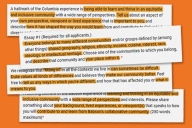You have /5 articles left.
Sign up for a free account or log in.
This is the time of the year when gymnasiums and lawns all over the country fill with graduates barely able to sit still during ceremonies before they will be set free to go on to do what they want or must in the next phase of their life.
This is also a time when faculty members retire from their profession or at least formally sever their day-to-day connection with the institution they have received a monthly direct deposit from, many of them remembering even the days when checks were typed and picked up in person in an envelope.
Sure, I am happy for these faculty members, now that they will go trout fishing, snoop in antiquarian bookshops, travel to Antarctica, and in some cases willingly, at least on the surface of the iceberg, throw out books altogether. But when it has to do with the faculty members being my mentors and retiring, that is a different story.
I have one mentor who is retiring this month who has given all of his books and files to a junior professor at the institution. Yes, I felt some sibling rivalry because there have been moments in my life when I imagined he would give me his collection of books, eventually. I had not anticipated he would retire so soon and I had expected that he would hang on to his books and files until he took his last breath or developed Alzheimer's, in which case his wife would tell me, "David always thought of you as his son ..."
But how do you just turn off an obsession after a life living with an obsession, and stop reading and writing about a particular author, as my mentor has? Well into the mid-term of my own career, I feel like a child running after the train, watching the rear carriage from behind, not even privy to a side view of the train, wondering and unable to see if my mentor is even waving to me.
But there he is, or rather, there in the upper left of a beautiful email "poster" announcing the celebration of 43 years of his dedicated service, is a picture of him as a young man, younger than I ever knew him when I was his student. He has movie star looks, like someone from the ’50s, a combination of Kirk Douglas (the dimpled chin), a short-haired Michael Landon, and I add a young Marlon Brando as I analyze his picture. In the right-hand bottom corner is a picture of him fairly recently, at his daughter's wedding, hair silver-gray and, as my wife keeps reminding me that it happens to all of us, he has a "broader look."
So why is it that I am so up in arms (even if my arms are raised inside my head or expressed mostly in the privacy of my study or in some phrases of complaint and sadness to my wife) over my mentor's retirement? Retirement is, after all, part of the natural cycle of society, and why would I not allow someone I care for so deeply and have known for so long to retire? No, it has at this point in my life not to do with my seeing my own mortality, though I too have come to know what it feels like to prepare for a colonoscopy, and my lungs do not breathe as easily as they did when my legs and lower back were able to take the pounding of running marathons.
I have over the last 20 years been exchanging emails with my mentor, he sending me jokes, announcements of news from the old school, me sending him news of my incremental academic and other achievements ("Look Dad, no hands!"), gripes, ideas for collaboration, things to read that I have written, and he has taken an interest in my life, somehow summoning the patience to read all that I have written and sent him, while carrying on in his duties as a full-time professor. All the while he has been "hovering," not looking over my shoulder, but somehow been a benign presence with me, and no, I will not stoop so low as to designate him with the label guardian angel.
So do I now mourn the interaction from a distance that I will no longer have with him? Is it the anticipation of not having our regular electronic discourse, like a habit of comfort, that ails me so? Surely I must get a grip on it, because there is no email in the grave or urn, and have I really expected or had the right to expect that my mentors would be living to a biblical age to be present via email as I too plan on living to be Methuselah?
I have three other mentors or father figures from the academy that are still alive, not having lost anyone prematurely to cancer or other dreadful disease. But their ages range from the 70s to 80s, and I exchange fewer emails with them. They are very much alive still, and I have not noticed any deterioration in their expression or wit. Their retirement has not shut down our communication, though emails are more sporadic and come in binges. They have been with me even longer than my mentor who is retiring this week and was my professor in graduate school.
These undergraduate professors have a continued presence like Frau Bauman, Frau Schmidt, and Frau Schwartze in Theodore Roethke's greenhouse poem, in which the poet looks back upon his youth and remembers their ability to expertly maintain a greenhouse while also paying him attention. Like the persona of the poem I have these mentors with me, but it is their commitment to a past, on my part, that I find unnerving. It is a presence that is not comforting, because their absence is beginning to sound itself out louder than their presence.
One thing I am certain of is that I am not unique. As another confessional poet, Randall Jarrell, in "Next Day," which features a woman going through the dreary motions of shopping a supermarket the day after the funeral of a friend, writes, "But really no one is exceptional." He is referring to death awaiting us all, and I would hope retirement precedes death, but it is the lack of "uniqueness" that bothers me, not because it is so, but because it means having to go through mourning the loss of one's mentors, the declining frequency of communication followed by having only the occasional memory appear of these mentors.
I am certain others recognize themselves in not wanting to let go of mentors or feel their daily, weekly or monthly presence throughout their life and career. Others must miss the ping of an email arriving from a mentor, the reading of a mentor's manuscript before it appears in publication, the humorous commiseration of some of academe's minor annoyances.
So I ask, is there a confessional poem for academics who are feeling lonely as their mentors increasingly live in their heads and the clanging of the keyboard about what we thought mattered while we were working diminishes, as if our hearing were getting worse?
After all, no one is exceptional.








